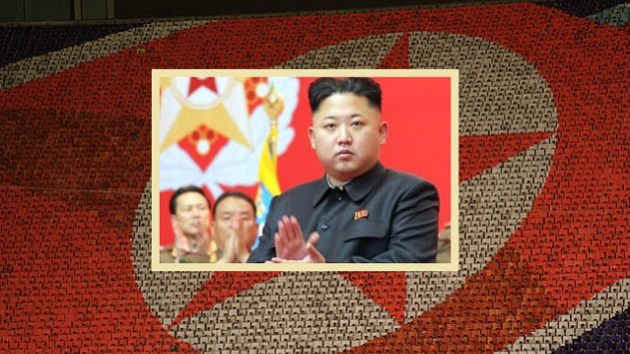This man is guilty of the imprisonment and torture of 30,000 Christians!
Daily we read about the persecution and killing of Christians and Jews. Those being oppressed are voices crying out for justice. This issue is falling on deaf ears both here in the United States, across Europe, Africa, the Middle East and now in North Korea.
Testimony before the United Nations Human Rights Council:
“A witness saw a young woman who folded her hands in a praying fashion when the SSD [State Security Department] interrogated her. The SSD suspected therefore that she was a Christian. They took her to another room and beat her until she confessed.”
LettersofConfession.com reports:
Every day in North Korea’s prison camps, 30,000 Christians rise in the predawn hours, eat a few mouthfuls of corn porridge and cabbage, and trudge to an assigned workplace. They then spend about 15 hours toiling in coal mines, cleaning and maintaining the camp, or doing farm work or construction work. In late evening, they return to housing units or apartments above their workplace to eat the same meager meal before falling to sleep on concrete floors.
Other Christians are not so fortunate. Instead of laboring for hours at backbreaking work under the eye of cruel guards, they’re locked in torture chambers and underground prisons. Survivors of North Korean prison camps have described being locked in cages like animals, forced to stand for hours in tortuous positions and beaten until they vomited blood.
About 200,000 North Koreans are thought to be detained in prison camps that aren’t even acknowledged by the communist government to exist. Authorities are very careful to conceal details about the camps from the outside world. The camps are disguised as military or farming facilities, and only officials with special security clearance are permitted to visit. During a United Nations investigation that culminated in an incriminatory report earlier this year, North Korean authorities repeatedly denied investigators entrance to the camps.
North Koreans found guilty of lesser infractions are sent to the kyohwaso, or ordinary labor camps, from which they might one day be released. But those found guilty of serious “crimes,” such as practicing Christianity, are sent to the kwanliso, controlled areas for political prisoners. The regime often arrests entire families, punishing three generations of a family for the crime of one member.
Most political prisoners sent to the kwanliso are incarcerated for life, if they aren’t executed immediately. Inmates are denied contact with the outside world, and not even their closest family members receive information on their whereabouts. Very few people have ever been released from a kwanliso.
There are four known kwanliso prison camps. Camp 14 holds about 15,000 prisoners, who work in mines, and only one person is known to have ever escaped. Camp 15, which holds about 30,000 prisoners, is unique in that it has separate areas for those imprisoned for life (Total Control Zones) and those considered redeemable through labor (Revolutionary Zones). Camp 16, which is located near a nuclear test site in the north, is thought to hold 20,000 prisoners. And Camp 25, which is more like a maximum security prison, holds only a few thousand prisoners but has doubled in size since 2006.
Conditions in the camps are so bad that nearly 40 percent of inmates die of starvation, while others commonly lose up to half their body weight. Prisoners tell of eating grass and rats to survive and of fighting over a single kernel of corn. One escapee, Shin Dong-hyuk, said his own mother began to compete with him for food. Survivors of these camps are often permanently disfigured from torture and from being chained to walls for days or weeks at a time.
Most of those who have disappeared into kwanliso in recent years have been found guilty of one of three crimes: they tried to flee North Korea, they had unauthorized contact with citizens of South Korea, or they were revealed as Christians. According to testimony before the United Nations, Christianity in North Korea “has been compared to a drug, narcotics, a sin and a tool of Western and capitalist invasion.” The work of Christian missionaries is “akin to vampirism.”
While Christianity is not explicitly illegal and a few show churches are even allowed in Pyongyang, in practice, authorities consider adherence to the Christian faith a political crime. State security makes concerted efforts to identify Christians. Agents are trained to suppress religious activities and to systematically interrogate repatriated citizens about their contact with churches and missionaries while outside North Korea. Those found to have engaged in such conduct face harsher punishment.
The 30,000 believers in these concentration camps are prisoners of a war being waged on Christians in North Korea. It’s a war that began in 1948, when North Korea was established as a state. North Koreans, who share the gospel, as Mrs. Park did, pay a high personal price. Secret Christians there have known and accepted this for years. They fully expect their faith to result in their imprisonment. However, a Christian who works closely with North Korean defectors said they do not regard imprisonment with surprise or outrage; on the contrary, they regard the prison camps as their mission field and view everything leading to their imprisonment as training.
RELATED ARTICLES:
Nigeria: Islamic jihadists of Boko Haram kidnap 20 more women
EDITORS NOTE: The featured photo of President Kim Jong Un of North Korea is courtesy of Reuters/KCNA.



Trackbacks & Pingbacks
[…] https://drrichswier.com/2014/06/10/man-guilty-imprisonment-torture-30000-christians/ […]
Comments are closed.